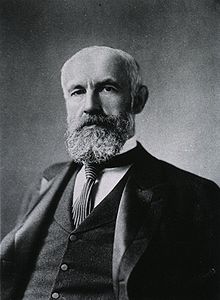Granville Stanley Hall
Granville Stanley Hall (1 shkurt 1844 – 24 prill 1924 [1] ) ishte një psikolog dhe edukator amerikan që fitoi doktoraturën në psikologji të në Kolegjin e Harvardit në shekullin e nëntëmbëdhjetë. Interesat e tij u përqendruan në zhvillimin e jetëgjatësisë njerëzore dhe teorinë e evolucionit. Hall ishte presidenti i parë i Shoqatës Amerikane të Psikologjisë dhe presidenti i parë i Universitetit Clark . Një studim i vitit 2002 nga Review of General Psychology e renditi Hall-in si psikologun e 72-të më të cituar të shekullit të 20-të, në një lidhje me Lewis Terman . [2]
Granville Stanley Hall | |
|---|---|
 Granville Stanley Hall by Frederick Gutekunst, circa 1910 | |
| Lindi | Granville Stanley Hall 1 shkurt 1844 Ashfield, Massachusetts, U.S. |
| Vdiq | 24 prill 1924 (78 vjeç) Worcester, Massachusetts, U.S. |
| Kombësia | American |
| Shkollimi | |
| Karriera shkencore | |
| Fushat | Psychology |
| Institucionet | |
| Këshilltarët e doktoraturës | William James |
| Studentët e doktoraturës | William Lowe Bryan, Frederic Lister Burk |
| Nënshkrimi | |
Biografia
RedaktoHall lindi më 1 shkurt 1846 në Ashfield, Massachusetts. Ai studioi në Williams College dhe më pas në Union Theological Seminary, por interesat e tij u zhvendosën nga teologjia drejt shkencave sociale dhe psikologjisë. Studimet e tij u përmirësuan ndjeshëm pas udhëtimit në Gjermani, ku pati mundësinë të studiojë nën udhëheqjen e Wilhelm Wundt, babai i psikologjisë eksperimentale.
Në vitin 1884, Hall u bë profesori i parë amerikan i psikologjisë në Universitetin Johns Hopkins, ku ndihmoi në ngritjen e një laboratori psikologjik. Në këtë periudhë, ai promovoi idetë e reja të eksperimentimit në psikologji, duke e bërë atë një shkencë të pavarur. Në vitin 1887, ai themeloi revistën shkencore American Journal of Psychology, një nga publikimet më të rëndësishme në këtë fushë.
Një tjetër arritje e madhe e Hall ishte themelimi i Universitetit Clark në Worcester, Massachusetts, ku ai shërbeu si rektor për 31 vjet. Në Universitetin Clark, ai krijoi një qendër për studime të avancuara në psikologji dhe ftoi figura të shquara të kohës, si Sigmund Freud dhe Carl Jung, për të ligjëruar në Shtetet e Bashkuara, duke kontribuar në përhapjen e psikanalizës në Amerikë.
Kontributet e Hall përfshijnë gjithashtu një fokus të veçantë mbi zhvillimin e adoleshencës, të cilën ai e pa si një periudhë të veçantë dhe të rëndësishme të jetës. Vepra e tij më e njohur, Adolescence: Its Psychology and Its Relations to Physiology, Anthropology, Sociology, Sex, Crime, Religion and Education, botuar në vitin 1904 pati një ndikim të jashtëzakonshëm në fushën e psikologjisë pedagogjike dhe teoritë e zhvillimit njerëzor.
Megjithatë, pikëpamjet e Hall shpesh janë kritikuar për tendencën drejt racizmit dhe seksizmit, sidomos në teoritë e tij për dallimet racore dhe gjinore, që shpesh pasqyronin paragjykimet e kohës.
Hall u tërhoq nga pozicioni i tij si rektor në 1920 dhe vdiq më 24 prill 1924. Sot, ai njihet për rolin e tij themelor në themelimin e psikologjisë si një disiplinë të veçantë akademike dhe për ndikimin e tij në trajtimin e çështjeve të edukimit dhe zhvillimit të njeriut.[3] [4] [5] [6] [7]
Publkime
Redakto- Adolescence : its psychology and its relations to physiology, anthropology, sociology, sex, crime, religion and education (1904)
- Aspects of German Culture (1881)
- Hints toward a Select and Descriptive Bibliography of Education (1886), with John M. Mansfield
- The Contents of Children's Minds on Entering School (1893)
- Supervised the study Of Peculiar and Exceptional Children by E. W. Bohannon, Fellow in Pedagogy at Clark University (1896)
- A Study of Dolls (1897)
- Confessions of a Psychologist (1900)
- Hall, G. S. (1903). The white man's burden versus indigenous development of the lower races. The Journal of Education, 58(4,1438), 83-83.
- Adolescence (Volume 1, Volume 2 1907)
- Spooks and Telepathy (1908)
- Youth: Its Education, Regimen, and Hygiene (1909)
- Introduction to Studies in Spiritism by Amy Tanner (1910)
- Educational Problems (Volume 1, Volume 2 1911)
- Hall, G. S. (1917b). Practical relations between psychology and the war. Journal of Applied Psychology, 1(1), 9-16. https://doi.org/10.1037/h0070238
- Jesus, the Christ, in the Light of Psychology (Volume 1, Volume 2 1917)
- Founders of Modern Psychology (1912)
- Morale, The Supreme Standard of Life and Conduct (1920)
- Aspects of Child Life and Education (1921)
- Senescence, The Last Half of Life (1922)
Shih edhe
RedaktoReferime
Redakto- ^ Thorndike, Edward (1925). Biographical Memoir of Granville Stanley Hall (PDF). National Academy of Sciences.
{{cite book}}: Mungon ose është bosh parametri|language=(Ndihmë!) - ^ Haggbloom, Steven J.; Powell, John L. III; Warnick, Jason E.; Jones, Vinessa K.; Yarbrough, Gary L.; Russell, Tenea M.; Borecky, Chris M.; McGahhey, Reagan; etj. (2002). "The 100 most eminent psychologists of the 20th century". Review of General Psychology. 6 (2): 139–152. CiteSeerX 10.1.1.586.1913. doi:10.1037/1089-2680.6.2.139.
{{cite journal}}: Mungon ose është bosh parametri|language=(Ndihmë!) - ^ "Hall, Granville Stanley". Virtual Laboratory of the Max Planck Institute for the History of Science. Marrë më 26 tetor 2022.
{{cite web}}: Mungon ose është bosh parametri|language=(Ndihmë!) - ^ Eugene Taylor. (2009). The Mystery of Personality: A History of Psychodynamic Theories. Springer. p. 30. ISBN 978-0387981031
- ^ John Melton. (1996). Psychical Research in Encyclopedia of Occultism & Parapsychology. Gale Group. ISBN 978-0810394865
- ^ Wade Pickren, Alexandra Rutherford. (2010). A History of Modern Psychology in Context. Wiley. ISBN 978-0470276099
- ^ Paul Kurtz. A Skeptic's Handbook of Parapsychology. Prometheus Books. p. 551. ISBN 978-0879753009